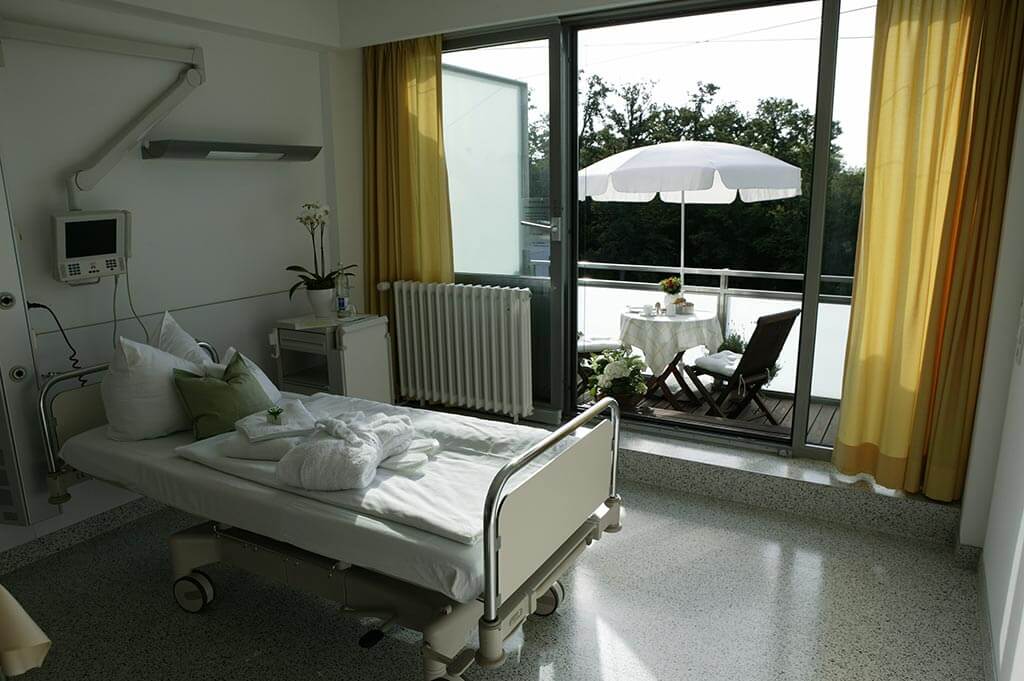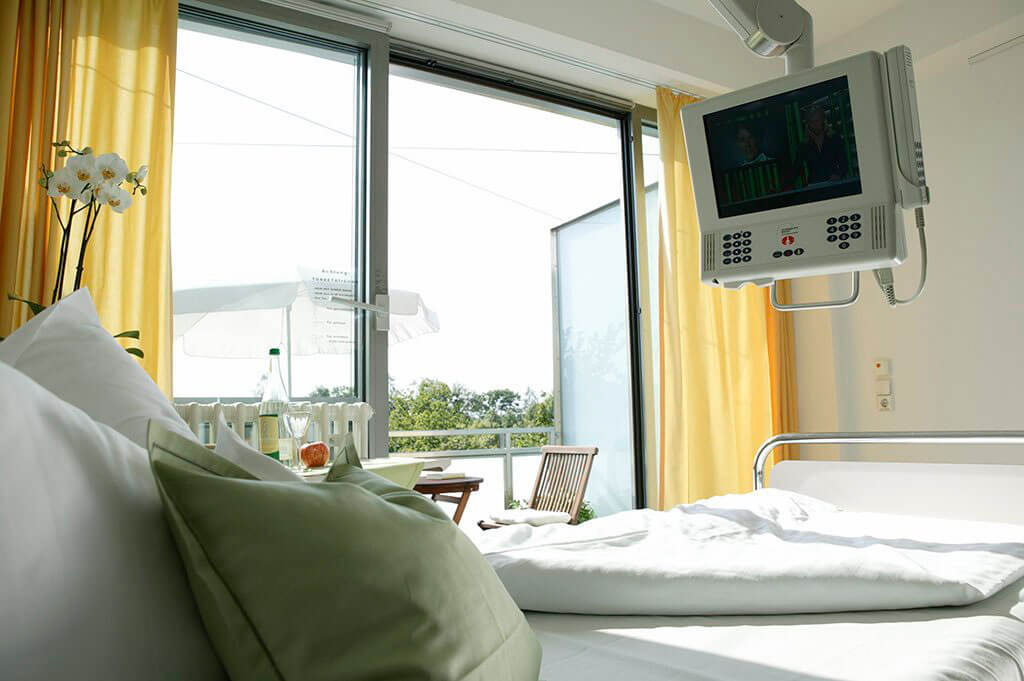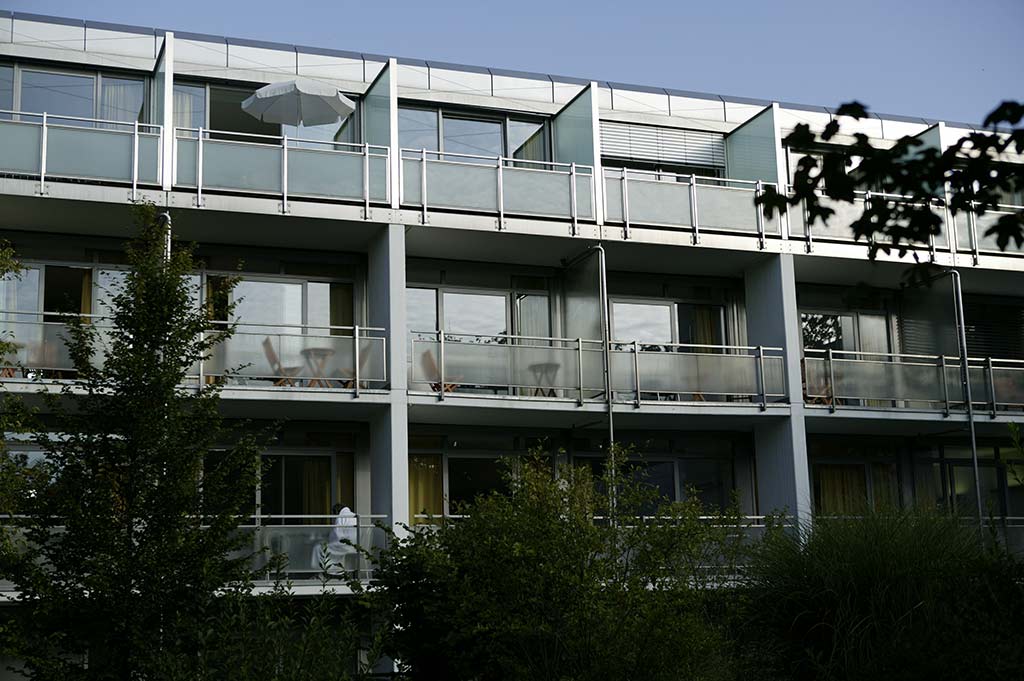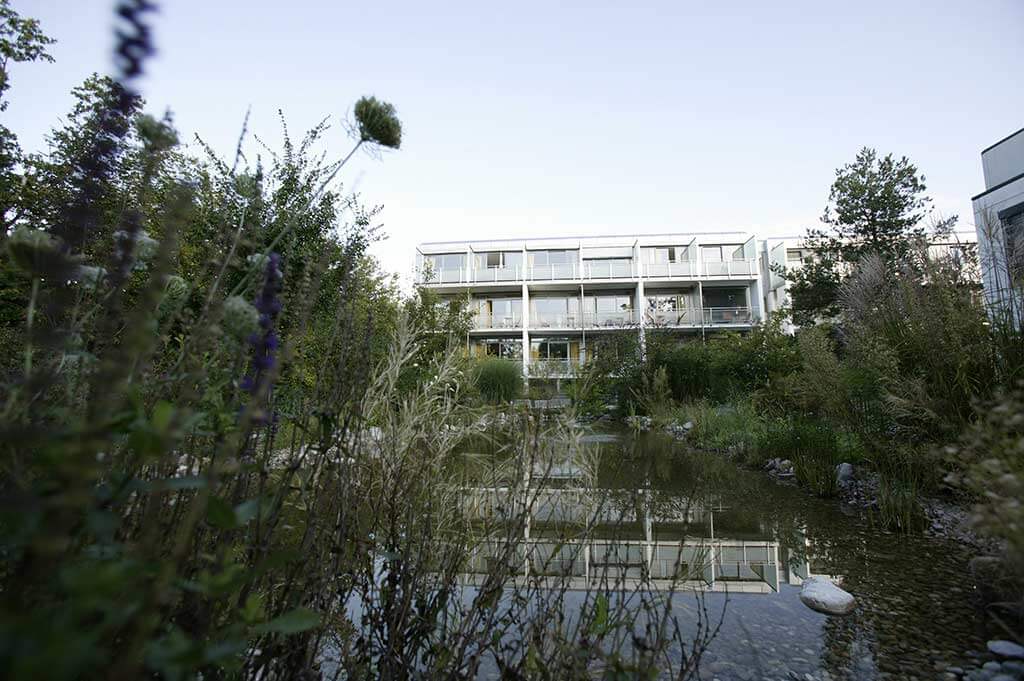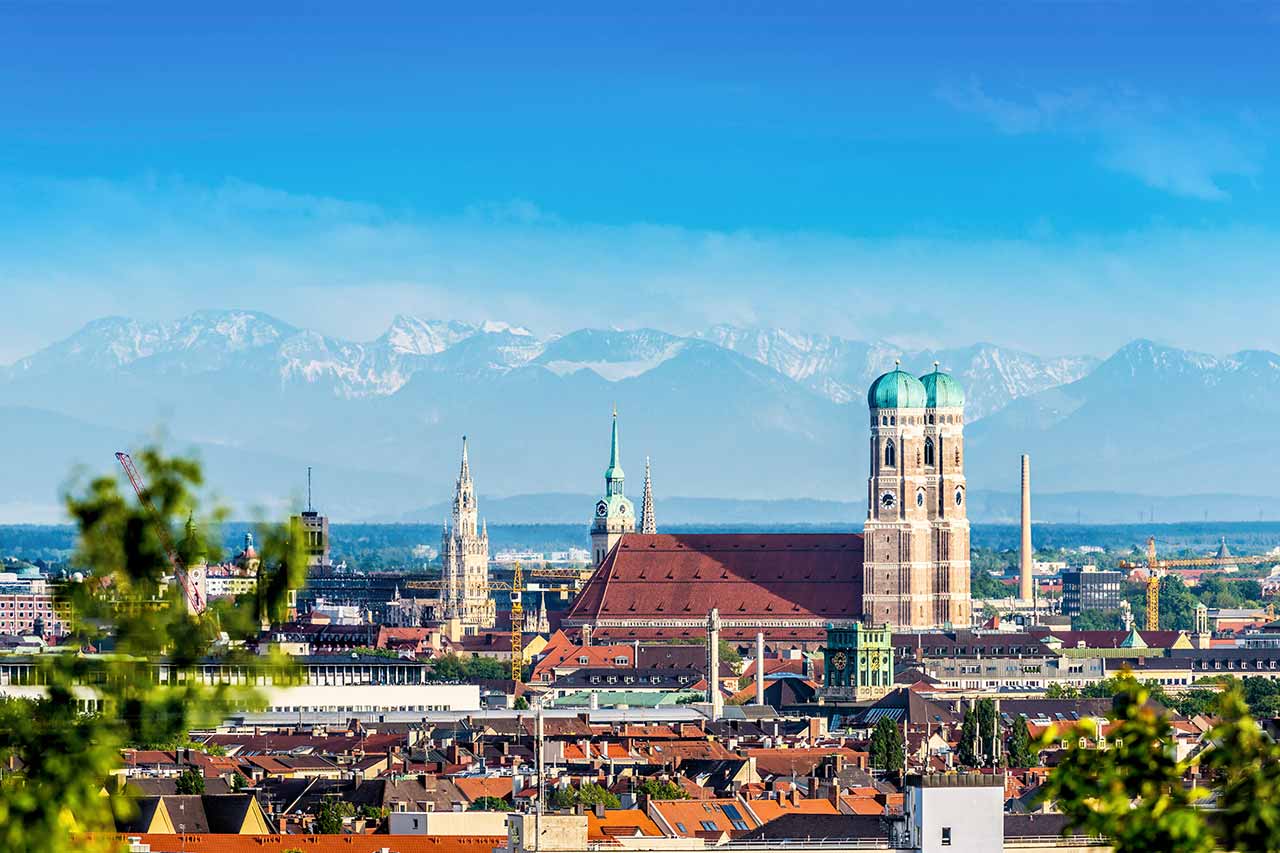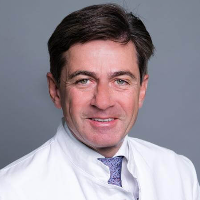
The program includes:
- Initial presentation in the clinic
- clinical history taking
- review of medical records
- physical examination
- urological examination
- laboratory tests:
- complete blood count
- general urine analysis
- biochemical analysis of blood
- inflammation indicators (CRP, ESR)
- indicators of blood coagulation
- tumor markers, PSA
- ultrasound scan of the urogenital system
- CT scan/MRI of the abdomen and pelvis
- preoperative care
- radical cystectomy and subsequent reconstruction
of the bladder with da Vinci robotic system - histological and immunohistochemical
examination of the removed tissues - symptomatic treatment
- control examinations
- the cost of essential medicines and materials
- nursing services
- full hospital accommodation
- explanation of future recommendations
How program is carried out
During the first visit, the physician will conduct a clinical examination and go through the results of the available diagnostic tests. After that, you will undergo the necessary additional examination, such as the assessment of liver and kidney function, ultrasound scan of the genitourinary system, CT scan and MRI. Based on the results of an additional examination, the physician will clarify the stage of the oncological process, choose the surgical technique and the type of anesthesia.
Surgery with the da Vinci robot starts with general anesthesia. After anesthesia, the surgeon makes small incisions on the anterior abdominal wall, through which he inserts the da Vinci robot manipulators and a video camera into the abdominal cavity. With the help of manipulators, the doctor dissects the ligamentous apparatus of the bladder and removes it. After that the doctor forms a new bladder from a part of the small intestine. The video camera continuously transmits a three-dimensional image of the surgical area in 12-fold magnification to the monitor. The surgeon installs drainage into the abdominal cavity and finishes the operation.
After tumor removal and forming a new bladder with the da Vinci robotic system, you will urinate naturally, through the urethra. The process of urination in this case will occur due to the work of the abdominal muscles.
After the completion of the operation, you will be transferred back to the ward, under the supervision of the attending physician and nursing staff. Due to the minimal invasiveness of the operation and the short duration of general anesthesia, you will not need to stay in the intensive care unit for a long time.
Finally, the attending physician will evaluate the results of control examinations, schedule the date of discharge from the hospital and give you detailed recommendations for further follow-up and treatment.
Service
You may also book:
 BookingHealth Price from:
BookingHealth Price from:
About the department
The Department of Adult and Pediatric Urology, Andrology at the Urology Clinic Munich-Planegg Munich offers the full range of services for the diagnostics and treatment of urologic diseases in men and children, as well as urogynecologic disorders in women. One of the priority focuses of the department's specialization is the restoration of a sexual potency in men. According to the international ratings, this is the best hospital in Europe, where a team of urologists effectively treats erectile dysfunction. Another key focus of the department's work is on the treatment of benign and malignant prostate diseases. To treat prostate cancer, the doctors perform low-traumatic robot-assisted interventions using the very latest da Vinci® XI HD surgical system. The therapeutic offer is complemented by the treatment of pathologies of the kidneys, ureters, bladder, testicles and penis. In the field of pediatric urology, the correction of congenital malformations of the reproductive system in boys is of particular interest. The department's doctors are true professionals in their area of specialization, so the patients can be sure that they will certainly find an effective solution even for the most complex clinical case.
The department's team of doctors is headed by Prof. Dr. med. Martin Kriegmair and Dr. med. Ralph Oberneder. Both head physicians have passed their board certification in urology and are excellent specialists in their field of competence. Prof. Martin Kriegmair has been working in the Departments of Urology at leading medical facilities in Germany for more than 20 years. The doctor successfully performs minimally invasive and robot-assisted da Vinci surgery on patients with prostate, kidney, and bladder cancers. The specialist is the author of more than 190 publications in print and online resources at the national and international levels. Prof. Kriegmair and Dr. Oberneder also collaborate with the German, European, and American Societies of Urology, of which they are members.
One of the department's main specializations is the treatment of erectile dysfunction (impotence) in men. When solving this intimate problem, the specialists show maximum delicacy. The choice of the most suitable treatment method is based on the preliminary comprehensive diagnostics in the department's in-house laboratory. The doctors assess sex hormone levels, the patency of the penile vessels and the state of the nerve endings. If necessary, the patient undergoes a comprehensive examination to detect concomitant diseases that may affect his potency. All these measures are followed by the development of a treatment plan for erectile dysfunction with the help of hormone drugs, minimally traumatic surgical procedures, physiotherapy and psychotherapy. The comprehensive treatment regimens completely restore potency, eliminate " the fear of failure before a sexual intercourse" and provide a man with the opportunity to become a father in the future.
In the field of andrology, the department deals with the treatment of men with hormonal imbalances, including due to the age-related changes, and infertility. Infertility is often caused by the previously suffered urologic pathologies, such as varicocele, cancer, undescended testicles (including after a surgical repair in the childhood), inflammatory diseases of the male reproductive system. In addition, male infertility may be the result of a previous sterilization. The department's doctors have the necessary resources to provide the patient with the comprehensive diagnostics and detect the exact causes of infertility. In 40% of cases, the cause of male infertility is varicocele, which is varicose veins in the testicles. The specialists of the medical facility successfully cope with the pathology using sclerotherapy. The therapeutic procedure is performed under local anesthesia, on an outpatient basis. In some cases, a minor microsurgical intervention may be required. The department's patients are quite often diagnosed with sperm production disorders, which respond well to drug therapy.
Since May 2009, the department has been a certified Prostate Cancer Center in Munich (certification of the Association of German Prostate Cancer Centers) and a highly specialized Center for Benign and Malignant Prostate Diseases. An interdisciplinary society of medical professionals provides individual comprehensive diagnostics and counseling. In a case of localized prostate cancer, the highly skilled surgeons manage to preserve the man's erectile function and his full ability to control urination. This is possible thanks to the use of the most sparing surgical techniques, including the da Vinci surgical system. In addition, the department successfully performs brachytherapy – an internal radiation therapy for the treatment of localized prostate cancer. The therapeutic procedure involves the image-guided implantation of radioactive "seeds" directly into the cancer focus. Depending on the stage of prostate cancer, the patients are offered to undergo a low-dose or high-dose brachytherapy. The first option is usually prescribed for the patients with small non-aggressive tumors, and in this case the irradiation takes a relatively long period of time. The high-dose brachytherapy is an effective treatment for advanced prostate cancer. In this case, a high dose of radiation is used, but the duration of the internal irradiation is as short as possible. The high-dose brachytherapy is usually combined with external beam radiation therapy. Due to the targeted effect of radiation on a malignant prostate tumor, brachytherapy achieves excellent therapeutic results, does not damage the healthy tissues, and also eliminates the risk of severe side effects.
The department's specialists also pay due attention to the early detection of prostate cancer. Currently, a PCA-3 test and a prostate HistoScanning are promising. The PCA-3 test is a molecular genetic test for the early detection of prostate carcinoma. In this case, the cells of the prostate gland obtained during the urinalysis are examined. HistoScanning™ is an innovative, painless, outpatient, and computer-assisted procedure for an ultrasound scanning of the prostate gland for suspected cancer.
Along with the surgical treatment of urologic cancers, the department offers a wide range of drug therapies. These include, in particular, intravenous chemotherapy, as well as systemic therapy using the very latest anticancer drugs.
In the treatment of benign urologic diseases, special attention is paid to the surgical interventions for kidney stone disease and urinary incontinence in women, as well as to plastic reconstructive urology after accidents. The department's specialists also have vast experience in the treatment of testicular and penile diseases, as well as genitourinary infectious lesions.
The specialists in the field of pediatric urology successfully repair congenital pathologies of the kidneys, urinary tract and external male genitalia (for example, hypospadias). Most urological interventions in young patients are not major, and therefore they are performed on an outpatient basis (for example, circumcision for phimosis). To ensure the most sparing treatment for young patients, the doctors prefer minimally invasive surgical techniques.
The department specializes in the diagnostics and treatment of the following diseases:
| Andrology |
|
| Urology |
|
| Other urologic and andrologic diseases |
The department's range of medical services includes:
| Diagnostics |
|
| Treatment |
|
| Other diagnostic and treatment methods |
Curriculum vitae
Higher Education and Professional Career
- 1978 - 1984 Study of Human Medicine at Ludwig Maximilian University of Munich.
- 1984 State Medical Examination and admission to clinical practice.
- 1985 Assistant Physician in the Department of Surgery at the University Hospital Luebeck.
- 1986 Doctoral thesis defense with honors. Subject: "Specificities of the formation of necrosis during bipolar radiofrequency coagulation".
- 1986 Assistant Physician in the Department of Urology at the University Hospital Luebeck.
- 1989 Assistant Physician in the Department of Urology at the University Hospital of Ludwig Maximilian University of Munich, Campus Grosshadern.
- Since 1989 Medical Consultant at the Comprehensive Cancer Center Munich (focus on bladder cancer and renal cell carcinoma).
- 1990 Board certification in Urology.
- 1990 Senior Physician, Department of Urology, University Hospital of Ludwig Maximilian University of Munich, Campus Grosshadern.
- 1995 Venia legendi in Urology at Ludwig Maximilian University of Munich, as well as the title of PD by the Bavarian State Ministry for Education, Culture, Science and Art.
- 1997 Start of the work at the General Urology Practice of Ebersberg.
- 1999 Additional qualification in Special Urologic Surgery.
- 2000 Authorized to carry out postgraduate education in Urology.
- 2001 Board Member of the Working Group of the Urology Center Munich.
- 2002 Extraordinary Professorship, Ludwig Maximilian University of Munich.
- 2002 Head Physician of the Department of Adult and Pediatric Urology, Andrology at the Urology Clinic Munich-Planegg Munich.
- 2003 President of the South Eastern German Society of Urology.
- 2011 Managing Director of the MedVZentrum Ebersberg GmbH.
Clinical Interests
- da Vinci robot-assisted surgery.
- Nerve-sparing radical prostatectomy.
- Radical cystectomy with bladder reconstruction.
- Organ-preserving surgery for kidney tumors.
- Reconstructive urethral surgery.
- Transurethral resection of the prostate.
- Transurethral resection of the bladder.
Honors
- 1994 Poster Award of the American Urological Association.
- 1995 Award for Innovations in Urology, Doctor Robert Pfleger Foundation.
- 1996 Award for Video Material of the German Society of Urology.
- 1997 Annual Audio-Visual Award of the American Urological Association (Second Award).
Memberships in Professional Societies
- German Society of Urology (DGU).
- American Urological Association (AUA).
- European Association of Urology (EAU).
- Professional Association of German Urologists (BDU).
Photo of the doctor: (c) Urologische Klinik München-Planegg
Sources:
About hospital
According to the Focus magazine, the Urology Clinic Munich-Planegg Munich ranks among the best specialized hospitals in Germany!
The hospital was founded in 1970 by Dr. med. Rudolf Castringius. During that time, it became a leader in men's healthcare in Germany. In addition, the hospital has the status of one of the best medical facilities for the treatment of erectile dysfunction in the European medical arena. The hospital's priority focuses include urologic oncology, reconstructive surgery, general urology, andrology and pediatric urology. The pride of the medical center is its state-of-the-art technical base, which allows the doctors to perform the treatment of varying complexity. The hospital successfully performs surgical interventions on the prostate gland using the innovative da Vinci® XI HD surgical system, brachytherapy and other sparing, but highly effective therapeutic procedures, which are available only in the best hospitals in the world.
The hospital's medical team consists of 120 highly professional employees who annually admit about 3,200 inpatients and more than 6,500 outpatients. The outstanding quality of medical service and patient care is regularly confirmed by internal and external audits. For example, since 2007 the hospital has been certified according to the DIN ISO 9001 standards.
The key to the successful clinical practice of the medical facility is modern equipment for accurate diagnostics and effective treatment of all urological pathologies. Surgical treatment is performed using innovative surgical techniques and instruments – almost all urological interventions are performed with the use of minimally invasive techniques. Such an approach guarantees optimal results and a rapid postoperative recovery. In addition, the health of the patients is in the safe hands of the highly qualified specialists with long clinical experience. The doctors of the hospital enjoy an impeccable reputation in the professional medical communities, so many patients with urological pathologies want to undergo treatment here.
The hospital has all the necessary resources to provide a high quality medical care of the European level. At the same time, the emotional state of the patient, his comfort, and satisfaction with the treatment are important for the doctors. The specialists always devote enough time to a personal communication with their patient and show understanding for his life situation.
Photo: (с) Urologische Klinik München-Planegg, (c) depositphotos
Accommodation in hospital
Patients rooms
The Urology Clinic Munich-Planegg Munich offers single, double and triple rooms for the accommodation of patients. The patient rooms are equipped with maximum comfort – they have an ensuite bathroom with shower and toilet, wide sinks with a hairdryer, a balcony with teak wood furniture, adjustable beds, as well as the possibility of dimming the lights, a refrigerator, a safe, etc. The patient rooms also offer a flat-screen TV that receives international satellite channels, radio/CD and Wi-Fi.
Meals and Menus
The patients of the clinic are offered a daily changing menu, a hearty breakfast, coffee and sweets, as well as mineral water. Triple rooms offer a choice between two menus cooked in the clinic's private kitchen. You will be provided with an individual menu, if necessary.
Further details
Standard rooms include:
Accompanying person
Your accompanying person may stay with you in your patient room or at the hotel of your choice during the inpatient program.
Hotel
You may stay at the hotel of your choice during the outpatient program. Our managers will support you for selecting the best option.
